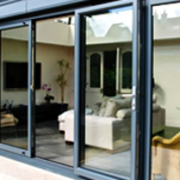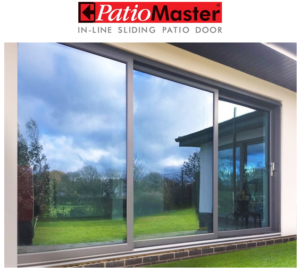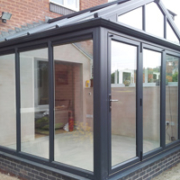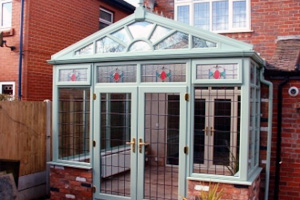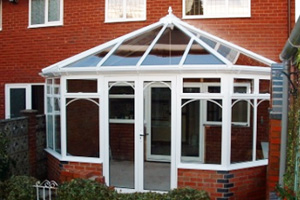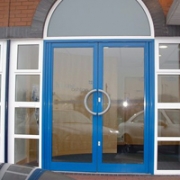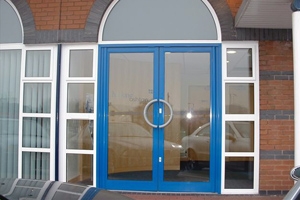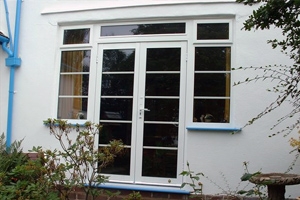Patio Doors: Sliding vs French Doors for Your Home
Patio Doors: Sliding vs French Doors for Your Home
Choosing the right glazed doors for your patio, decking or garden involves considering a lot of factors, including the available space, aesthetics, security and even the wind. Our team have summarised the key factors to think about and which door style is best for each. To compare sliding patio doors vs French doors quickly, we’ve included a handy table at the end of this article.
Sliding Patio Doors vs French Doors: What’s the Difference?
The main difference between these doors is the way they open. Sliding doors consist of two or more large, framed glass panes set parallel to one another in the doorframe. They slide across one another to open and provide a wide view of the exterior when closed.
French doors are hinged doors that swing outward. When closed, the latch mechanism sits in the centre, holding them together securely, with an additional locking pillar into the top and bottom of the door frame.
A Unique Alternative: Folding Doors
Folding Doors offer a modern approach perfect for creating large glazed areas that can open fully. With up to seven leaves, these doors fold in a concertina to open, hinging outward and inward while sliding in guide rails. They often have a strong, lightweight aluminium construction and narrow frames to allow maximum sunlight.
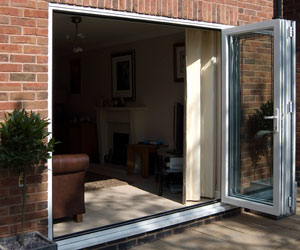
Best for Windy Areas
If your property is exposed to high winds, such as on top of a hill or without much shelter, a swinging exterior door can be caught and slammed. This can cause damage to the frame or hinges or cause injury on particularly gusty days. Safety restrictors can help prevent accidents with swinging doors.
However, slamming doors can be avoided altogether by installing sliding or bifold doors, which are not affected by the wind.
Best for Natural Light
All glazed doors let in a large amount of natural light and expand your view outdoors, making interiors look bigger and more welcoming. When choosing glazed doors, consider how the frames will impact this.
Sliding patio doors give you a larger area of view, but their frames are static, so the view is obscured even when open.
French doors are only as wide as two door sashes, but the central pillar moves with the slave sash, so your view is completely clear when doors are open.
The best of both is the bifolding door, which can allow light through a large area and open fully to create a completely open view. Narrow sight lines from aluminium frames let in maximum light even when these doors are closed.
Best for Space Saving
When choosing patio doors, consider how much space they will require to open and close. French doors can be built to cover a wide area when closed. However, when open, they will extend a long way from the wall, so are not ideal for small outdoor areas.
If the aperture is large, sliding doors are often a better option, as they glide in the tracks without the need for a clear area.
A bifold door requires a small amount of space to hinge into, but can be constructed with narrow leaves to minimise this requirement.
Best for Security
Door security depends greatly on the materials used, the glazing style and the locking mechanism. All three types of doors can be constructed from uPVC or aluminium, with multipoint locks and double or triple glazing. With all these features included, what type of patio door is most secure?
Because of their central mullion, French doors are more secure than sliding doors. The outer edge of both doors is sturdily fixed by hinges and the locking mechanism, making these patio doors completely secure.
Sliding patio doors are held in place by tracks to keep them aligned. Unfortunately, these doors can be jarred out of their tracks with enough force. This is usually solved with a multipoint locking system.
With Beaufort bifolds, you benefit from a strong aluminium frame and multipoint locking tested to PAS24 for security.
Best for Ventilation
Opening a patio door for airflow is one of the best ways to cool your home on hot summer days. With bifold and sliding doors, you control the size of the opening completely, while French doors provide fewer options.
Best for Ease of Opening
However, sliding doors require a certain amount of strength to open easily. Because they are held in place by guide-rails and require a pulling action across the body, any friction or debris in the rails can make opening these doors difficult for elderly or disabled people. Modern patio door designs are equipped with bearings and design features that make opening easier, but require regular lubrication to maintain smooth action.
Aluminium bifolding doors have fewer contact points with the guide rails, making them slightly easier to open. They are fitted with 4 stainless steel wheels ensuring smooth and consistent operation.
A French door opens outwards like any other door. Once the handle is depressed, they are completely released to swing outwards from the hinge. This makes them the easiest to open.
Best for Traditional Aesthetics
Older properties often benefit from more traditional features, particularly if they can be seen from the road. These properties often have only small areas suitable for adding an external door without major structural changes. For these reasons, we would recommend a French door, though sliding doors can also be constructed for smaller openings.
French doors can be fitted with Georgian bars within the double glazing or left clear, depending on what fits the property best.
Sliding doors and bi-fold doors can still add to a traditional home, however. You can choose colours and wood-grain effects for your patio doors to soften the appearance of uPVC or aluminium.
Best for Energy Efficiency
All three types of doors have tight-sealing frames and can be built with double or triple glazing, providing excellent thermal insulation.
Large double-glazed surfaces can also allow passive heat transfer from sunlight, acting as a greenhouse to warm your home even on cooler days. This lowers your energy use for heating. Similarly, opening a patio door ventilates your home quickly, without the need for extractor fans or air conditioning. It is unlikely to matter which door style you choose for the impact on energy efficiency.
Best Price
While we can’t share exact costs here, there are differences in the general price range of each type of patio door due to their construction and materials.
A sliding glass door is generally more cost-effective than a bi-fold door, particularly the PatioMaster in-line sliding door. With no hinges and a slimline frame, sliding doors are also generally cheaper than French doors, though this depends on the size of the aperture and features included.
CTA: Get a Quote
Sliding Doors vs French Doors vs Bifold Doors
| Feature | Sliding Patio Doors | French Doors | Bifold Doors |
| Wind-safe | ✔ | – | ✔ |
| Natural Light | ⭐⭐⭐ | ⭐⭐ | ⭐⭐⭐ |
| Space Saving | ⭐⭐⭐ | ⭐ | ⭐⭐ |
| Security | 🔒 | 🔒🔒🔒 | 🔒🔒 |
| Ventilation | ⭐⭐⭐ | ⭐ | ⭐⭐ |
| Easy to Open | ⭐ | ⭐⭐⭐ | ⭐⭐ |
| Aesthetic Style | High Glass | Georgian Bars Available | Modern |
| Energy Efficient | ✔ | ✔ | ✔ |
| Cost | £ | ££ | £££ |
Which Patio Door is Best for Your Home?
We hope this article has helped you understand how best to decide which doors are best for your property. We’ve covered the easiest type of patio door to open, the most secure and the style that will allow the most natural light into your home. Balance these factors to choose the right style for you.
For further advice or an accurate quote, contact Longton-Glass Ltd.

